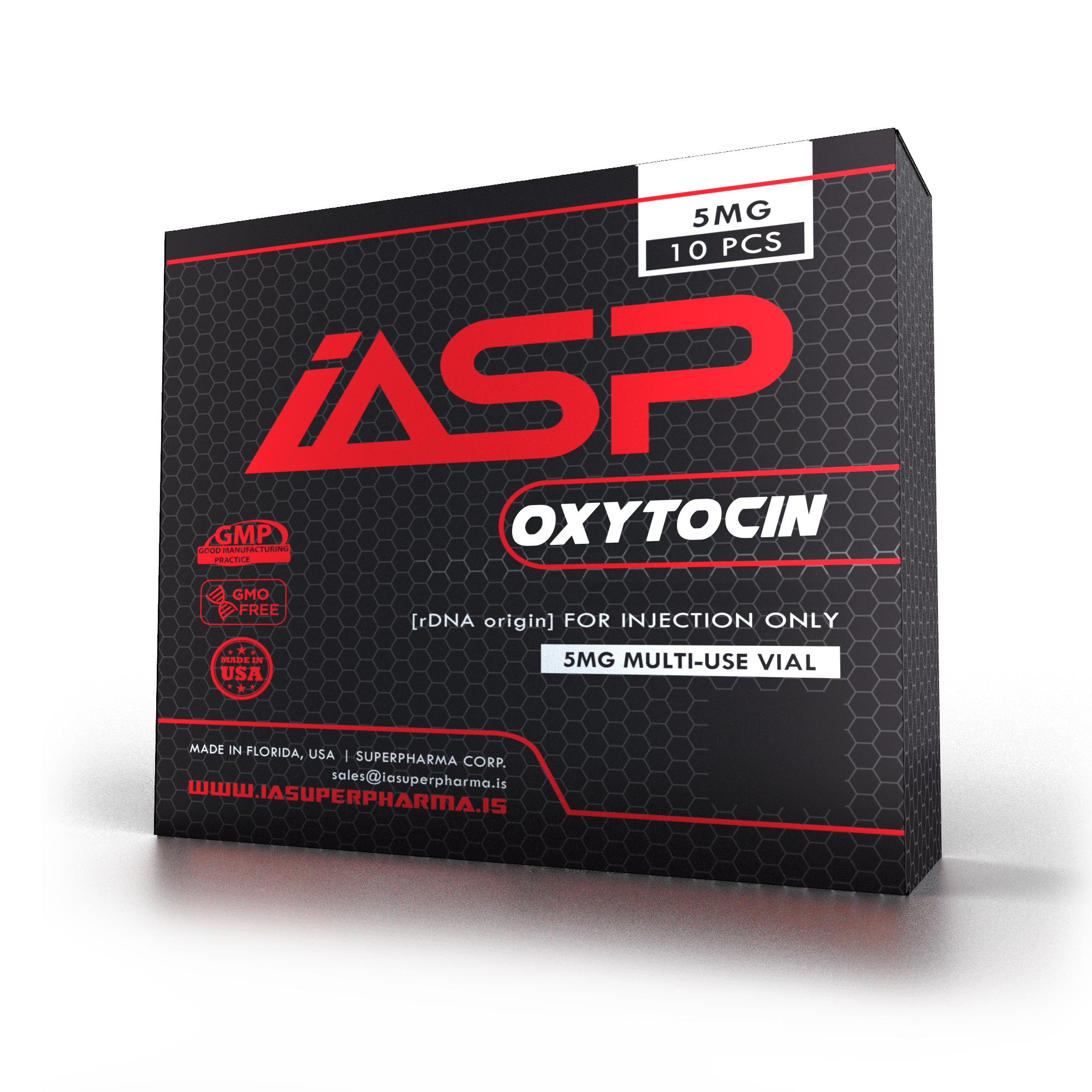This product is a box of 10 vials.
What Is Oxytocin ?
Oxytocin, a natural protein hormone, plays an important role in sexual reproduction, childbirth, bonding between mother and child during breastfeeding, and wound healing. New research suggests it may boost cognitive performance, reduce cardiovascular risk, and offset the effects of diabetes.
Sequence: Cys(1)-Tyr-Ile-Gln-Asn-Cys(1)-Pro-Leu-Gly
Molecular Formula: C43H66N12O12S2
Molecular Weight: 1007.193 g/mol
PubChem CID: 439302
CAS Number: 50-56-6
Synonyms: Pitocin, Endopituitrina, Ocytocin
Wound Healing
Oxytocin can help control inflammation by acting on certain inflammatory proteins. In a study of 37 couples, positive social interactions that raised oxytocin levels sped up wound healing. Higher oxytocin led to faster recovery. In contrast, hostility in relationships slowed healing by up to 40%, with lower levels of key healing proteins at the wound site.
Cardiovascular Risk
Given its role in wound healing and inflammation control, researchers think oxytocin may protect the heart and blood vessels. It can lower fat mass, improve blood sugar control, reduce blood pressure, and ease anxiety—all factors in heart disease. Oxytocin might serve as an add-on to current treatments for cardiovascular issues.
Low oxytocin receptor activity may contribute to atherosclerosis in some cases. Boosting oxytocin in people with low receptor levels can help maintain heart health and sometimes reverse plaque buildup.
In rats, giving oxytocin to the heart during a blockage, like a heart attack, protects heart muscle cells from dying. Long-term oxytocin treatment may prevent severe heart weakening and could help regenerate tissue by influencing stem cells, releasing protective factors, or merging with damaged cells.
In mice with diabetes, oxytocin reduced heart damage, cut body fat by 19%, and lowered fasting blood sugar by 23% through better insulin response. Treated mice had less heart dysfunction, reduced cell growth, scarring, and cell death.
Oxytocin seems to guard against damage from reduced blood flow in various tissues, not just the heart. In rats with prolonged erections, it protected against tissue injury by lowering nitric oxide levels.
Diabetes Management
Oxytocin may increase glucose uptake in muscles by improving insulin sensitivity, making it useful for diabetes treatment. In mice, it supports fat use, reducing overall body fat and abnormal blood fats. Low oxytocin can lead to obesity even with normal eating and activity, showing its role in energy balance.
In lean mice, oxytocin has little effect on blood sugar, insulin, or body makeup. But in obese mice, it makes a difference, suggesting it's more helpful in diabetes than in healthy states. In a study of people with diabetes, nasal oxytocin lowered blood sugar and insulin, leading to a 9 kg weight loss over eight weeks. Circulating oxytocin is often lower in type 2 diabetes and linked to higher blood sugar and insulin resistance.
Cognitive Performance
Lack of maternal care early in life can cause lasting changes in thinking and behavior. In mice, this may stem from altered oxytocin signaling due to poor bonding. Treating deprived mice with oxytocin improved hormone levels tied to brain development in the prefrontal cortex. While behavior didn't change much overall, there was a trend toward better thinking skills. Other mouse studies show nasal oxytocin slightly improves learning under stress.
Anxiety
Much evidence links oxytocin to anxiety and depression. Changes in the oxytocin receptor gene can cause social anxiety and childhood attachment issues. In untreated social anxiety patients, gene changes in the receptor suggest a way to compensate for low oxytocin. This implies social anxiety may partly result from reduced oxytocin activity.
Borderline personality disorder (BPD), an extreme form of social anxiety with threat sensitivity, mistrust, and odd social cues, ties to oxytocin issues. Nasal oxytocin in BPD patients modifies these behaviors. BPD is hard to treat and affects quality of life, so understanding oxytocin's role could improve outcomes for millions.
Hunger
In Prader-Willi syndrome, marked by endless hunger, excess suppression of oxytocin signaling plays a part. Oxytocin likely helps regulate hunger and may directly influence eating behavior.
Old Muscle
Oxytocin is key for maintaining and repairing healthy muscle, and its decline with age contributes to muscle wasting (sarcopenia). As blood oxytocin drops, so do muscle stem cell receptors. Giving oxytocin reverses this quickly, restoring healing potential. In older mice, muscle repair reached about 80% of young mice levels after treatment. Oxytocin might slow age-related decline in organs and reduce dysfunction.
Curious about Oxytocin?
Join our Facebook group to engage directly with thousands of others who use this product, and follow our Facebook/IG pages for hot updates and product announcements!


